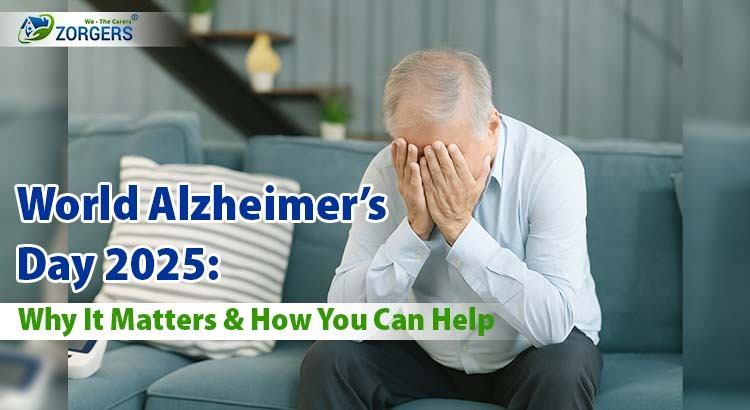-
Introduction
World Alzheimer’s Day is observed every year on 21 September, a day devoted to increasing awareness of dementia and Alzheimer’s disease. Communities, caregivers, medical professionals, and families unite during this time to raise awareness of Alzheimer’s, combat stigma, and emphasize the value of support for individuals with the condition.
-
What is Alzheimer’s Disease?
Alzheimer’s disease is a progressive neurological disorder that leads to memory loss, impaired thinking, and changes in behavior. It is the most frequent cause of dementia, a mental deterioration that is severe enough to disturb day-to-day functioning.
Signs and Symptoms of Alzheimer’s Disease
Here are some of the early signs and symptoms to watch for:
- Memory loss, forgetting recently learned material
- Difficulty in routine tasks
- Finding the Right words
- Time and place disorientation
- Mood and personality changes
- Withdrawal from hobbies or social activities
It is critical to identify these early indicators since prompt diagnosis can result in better planning, support, and quality of life.
-
Why World Alzheimer’s Day Matters
- Over 55 million people worldwide live with Alzheimer’s disease or other types of dementia.
- Alzheimer’s and dementia affect more than just people; they also have a significant emotional and financial impact on caregivers, families, and communities.
- The stigma, misconceptions, and myths surrounding Alzheimer’s disease are still pervasive. Many people feel embarrassed to discuss dementia or mistakenly think that memory loss is a natural aspect of aging. World Alzheimer’s Day is an opportunity to break down those barriers.
- Awareness also pushes for better research, early diagnosis, better care resources, and policies that support people with dementia and their caregivers.
-
How to Support Someone with Alzheimer’s
Supporting someone with Alzheimer’s involves empathy, patience, and practical measures.
Caregiving Tips
- Educate Yourself: Learn the stages of Alzheimer’s disease, what changes to expect, and what helps.
- Routines: Daily schedules give structure, reduce anxiety, and help manage memory loss.
- Environment: Make living spaces safer (clear paths, reduce clutter, use labels or signs for rooms).
- Encourage Independence: Let the person do what they can, help when needed.
Emotional Support
- Be a listener. Let them express feelings.
- Avoid correcting or confronting harshly.
- Social connections — visits, conversations, familiar activities.
- Respect identity and dignity. Alzheimer’s does not erase the person’s history or feelings.
-
Ways to Raise Awareness
Awareness is essential in reducing stigma and better understanding. Here are some practical Alzheimer’s awareness activities and ideas:
- Share Personal Stories: Blog posts, vlogs, social media posts from victims of Alzheimer’s.
- Events: Memory walks, seminar or webinar sessions, public talks in schools.
- Social Media Campaigns: Using hashtags like #AskAboutDementia, #AskAboutAlzheimers, #WorldAlzheimersDay to spread awareness.
- Quotes for Caregivers: Share World Alzheimer’s Day quotes for caregivers — can be encouraging, affirming.
- Workshops or Training: For healthcare workers and families about how to support someone with Alzheimer’s.
-
Conclusion
World Alzheimer’s Day — is a call to action for all of us. Whether through Alzheimer’s awareness, Alzheimer’s support, dementia awareness, or by learning the signs and symptoms of Alzheimer’s disease, we all have a role.
If You can, share this article. Talk to someone about Alzheimer’s. Join awareness activities. Support caregivers. Every action helps in building compassion, understanding, and support for those living with Alzheimer’s.
FAQs
Q1: What is the difference between Alzheimer’s disease and Dementia?
A1: Dementia is a general term for decline in cognitive function. Alzheimer’s disease is the most common cause of dementia.
Q2: What are the early signs of Alzheimer’s disease?
A2: Early signs include forgetting recent conversations or events, difficulty completing familiar tasks, trouble finding words, confusion about time or place, poor judgment and mood or personality changes.
Q3: How can someone support a person diagnosed with Alzheimer’s?
A3: Offer emotional support, maintain routines, simplify tasks, modify environments for safety, social engagement opportunities, and use empathy and patience. Caregiver resources and support groups are very helpful.
Q4: What Alzheimer’s awareness activities are effective?
A4: Story-sharing, community seminars, awareness walks, social media campaigns, public talks, and workshops for caregivers and health professionals are all effective.
Q5: What resources are available for Alzheimer’s caregivers?
A5: Local Alzheimer’s associations; online education; support groups; books; counseling; also sometimes financial aid or services depending on region.
Q6: Why is early diagnosis important in Alzheimer’s disease?
A6: Early diagnosis helps with planning, accessing resources, treatments (where possible), improving quality of life, and slowing progression or managing symptoms more effectively. It also lets caregivers prepare emotionally and logistically.





